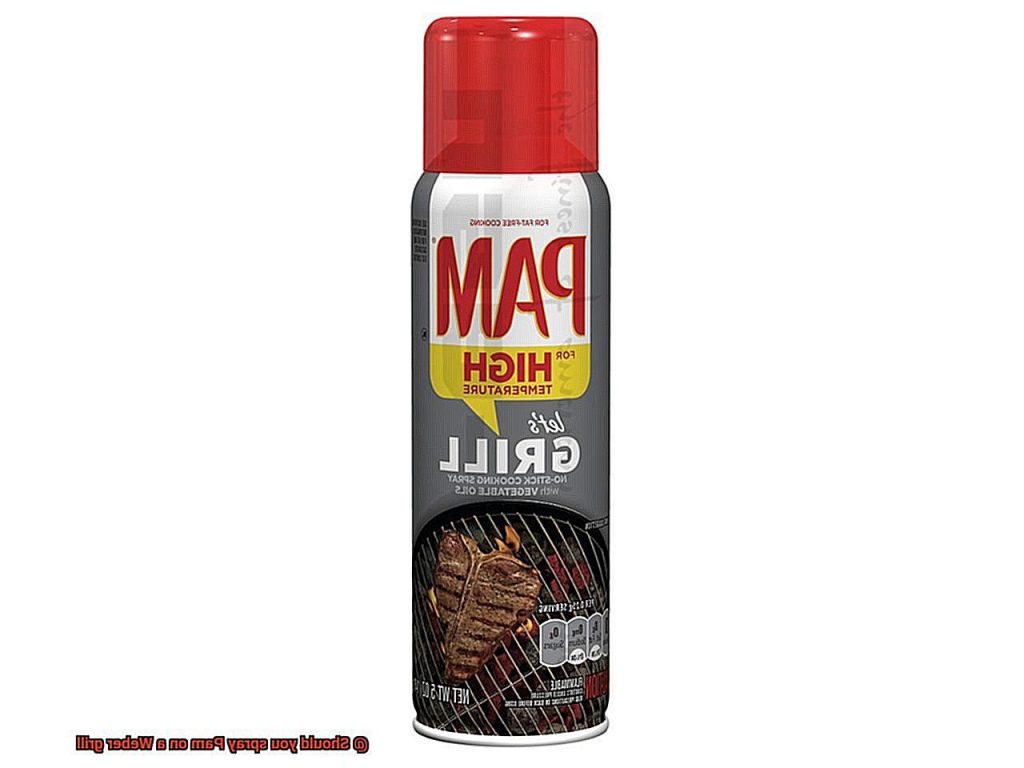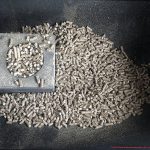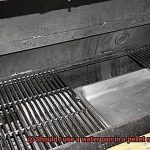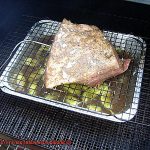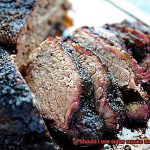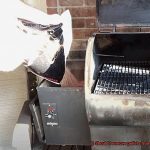Do you ever find yourself struggling with your Weber grill, trying to get the perfect sear and char on your meats and veggies? Have you ever wondered if spraying Pam on your Weber grill could make grilling easier? If so, you’re not alone.
As a passionate cook who loves to fire up my Weber grill, I know how important it is to get that mouth-watering BBQ just right. But sometimes, the grill can be a fickle friend. That’s why I wanted to investigate whether or not spraying Pam on a Weber grill is a good idea.
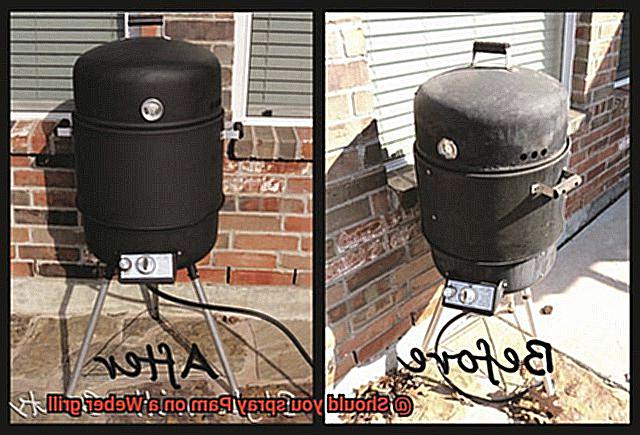
The opinions of grill enthusiasts are divided when it comes to this topic. Some swear by Pam spray, claiming it improves the taste of food and makes grilling easier. Others argue that using non-stick sprays like Pam on the grates can lead to flare-ups and negatively impact flavor.
In this post, we’ll take a deep dive into both sides of the debate. We’ll explore the pros and cons of using Pam on your Weber grill, share some tips for seasoning your grill grates without it, and provide helpful advice for getting the most out of your grill. By the time you finish reading this post, you’ll have all the information you need to decide whether or not spraying Pam on your Weber grill is right for you.
Contents
What is Pam?
When it comes to grilling, nothing beats the sizzle of perfectly cooked food. However, nothing ruins your grill game faster than food sticking to the grates. That’s where Pam comes in – a brand of non-stick cooking spray that has been a staple in kitchens since 1961.
Pam is a unique blend of oils, lecithin, and propellants that create a thin, even layer on cooking surfaces. The oils used are typically canola or soybean oil, healthy options for cooking. Using Pam on a Weber grill can be a game-changer, preventing food from sticking to the grates and making flipping and removal easier.
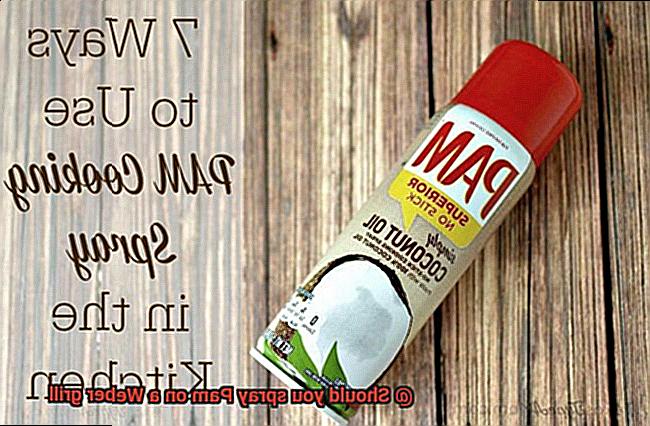
But not all Pams are created equal. Some varieties contain additives like flour or sugar that can burn and leave residue on the grill grates, affecting flavor and potentially damaging the grill. Therefore, it’s essential to choose a plain canola or soybean oil-based Pam without additional ingredients when grilling on a Weber grill.
If you want an alternative to Pam, brushing oil directly onto food or using non-stick grill mats are great options. Both methods prevent sticking while preserving the flavor of your food.
What Does Weber Say About Using Pam on Their Grills?
Weber, one of the most popular grill manufacturers in the world, recommends against using cooking spray or any aerosolized cooking oils on their grills. This is because cooking spray can leave a sticky residue on the grates, making it harder to keep your grill clean. Additionally, the propellants in these sprays are highly flammable and can ignite if they come into contact with an open flame.
Furthermore, using cooking spray can potentially damage the porcelain enamel coating on Weber grills. This coating is designed to withstand high temperatures and resist corrosion, but cooking spray can cause it to break down over time.
So what can you use instead? Weber suggests using a high-heat oil like vegetable or grapeseed oil applied with a brush or paper towel to lubricate the grates before cooking. This will help prevent sticking without causing any damage or safety concerns.
To summarize:
- Cooking spray is not recommended by Weber for their grills as it can leave a sticky residue, attract unwanted debris, and pose a safety hazard.
- The propellants in cooking sprays are highly flammable and can ignite if they come into contact with an open flame.
- Cooking spray can also potentially damage the porcelain enamel coating on Weber grills.
- Weber recommends using a high-heat oil like vegetable or grapeseed oil applied with a brush or paper towel as a safe and effective alternative to prevent sticking.
Potential Residue Buildup from Using Pam on a Weber Grill
While it might seem like a quick and easy fix, there is a potential downside that you should be aware of – residue buildup.
Residue left behind by cooking spray can quickly turn into a sticky mess on your grill grates. This buildup can not only affect the taste of your food, but it can also create clogs in the burner tubes and other parts of your grill, leading to uneven heating and other performance issues.
However, fear not. There are several steps you can take to prevent residue buildup and keep your Weber grill in top shape. Here are some expert tips:
Clean thoroughly after each use: Use a grill brush to scrape off any excess residue and then wipe down the grates with a damp cloth or paper towel. This will help to prevent any residual buildup from accumulating and causing issues down the line.
Use a non-stick cooking spray specifically designed for grilling: These sprays are formulated to be less likely to leave behind residue and are safe for use on grill grates. They also help to ensure that your food comes off the grill easily without any added mess or fuss.
Consider using alternative cooking methods: If you’re concerned about residue buildup, you might want to try alternative cooking methods such as grilling with foil or using a cast iron skillet. These methods can help to reduce the amount of residue left behind while still allowing you to enjoy all the delicious flavors of grilled food.
Flavor Impacts of Using Pam on a Weber Grill
As any true grill master knows, the flavor of your food is everything. But what about using Pam on a Weber grill? Will it impact the delicious taste of your meals? As an expert in all things grilling, I’m here to give you the scoop on the potential flavor impacts of using Pam on your Weber grill.
First and foremost, spraying Pam on a hot grill can create smoke and fumes that can add an unpleasant taste to your food. Not to mention, the residue left behind by the cooking spray can create a sticky surface on your grill grates, leading to uneven cooking and potential flavor loss. And if you’re using a cooking spray that contains additives like lecithin, it can contribute to off-flavors and leave a residue on your grill that builds up over time and affects future meals cooked on the same grill. That’s a recipe for disaster.
But don’t worry – there are plenty of alternative methods you can use to prevent sticking without sacrificing flavor or damaging your Weber grill. For starters, try brushing your grill grates with oil or using non-stick cookware designed specifically for grilling. These methods not only help maintain the delicious flavor of your food but also increase the longevity and overall quality of your Weber grill.
In addition to avoiding cooking sprays like Pam, there are other steps you can take to enhance the flavor of your grilled meals. For example, try experimenting with different types of wood chips or charcoal to add unique smoky notes to your food. You could also marinate your meats in flavorful sauces or spices before grilling for an extra burst of flavor.
Other Options to Prevent Food from Sticking on a Weber Grill
As a grill master, there’s nothing more disheartening than having your perfectly marinated meat stick to the grill grates. With that in mind, here are some alternative methods to prevent food from sticking on your Weber grill without relying on the old standby of Pam cooking spray.
One option is to use a non-stick cooking spray specifically designed for grilling, like the Weber Grill Spray. This spray is formulated to withstand high heat and can create a non-stick surface on your grill grates. Another easy fix is brushing the grates with oil before adding your food. You can use a silicone brush or a paper towel dipped in oil to achieve this.
If you’re looking for a natural solution, try rubbing half of an onion over the hot grill grates before placing your food on them. The natural oils in onions can create a non-stick surface and add extra flavor to your grilled dishes. Alternatively, you can invest in a cast iron grill grate. Cast iron is naturally non-stick and can be seasoned with oil to create an even better non-stick surface. It’s worth noting that cast iron grates require more maintenance than standard grates and should be cleaned and seasoned regularly.
Proper preheating of your Weber grill is also crucial in preventing food from sticking. This helps distribute heat evenly across the grates and creates a non-stick surface for your food. Additionally, avoid moving your food too soon after placing it on the grill – give it a few minutes to cook before attempting to flip or move it.
itgFKdlwP5I” >
Conclusion
In conclusion, the answer to whether or not you should spray Pam on a Weber grill is not black and white. The grilling community is divided on the issue, with some swearing by it while others argue against it due to flavor concerns and residue buildup. If you do choose to use Pam, make sure to opt for a plain canola or soybean oil-based version without extra additives that can burn and leave a mess on your grill grates.
However, it’s worth noting that Weber advises against using cooking sprays or any aerosolized cooking oils on their grills due to safety concerns and potential damage to the porcelain enamel coating. So, what are your options? Fear not. There are several alternative methods for preventing food from sticking without resorting to Pam.
Consider using non-stick cooking spray specifically designed for grilling or brushing the grates with oil before adding your food. Another trick is rubbing half an onion over the hot grill grates before placing your food on them for an added flavor boost. For those who want to take their grilling game up a notch, investing in a cast iron grill grate can be a game-changer.
Remember, proper preheating of your Weber grill is also key in preventing sticking and ensuring deliciously cooked meats and veggies every time. Ultimately, it’s up to you whether or not spraying Pam on your Weber grill aligns with your personal preferences.

